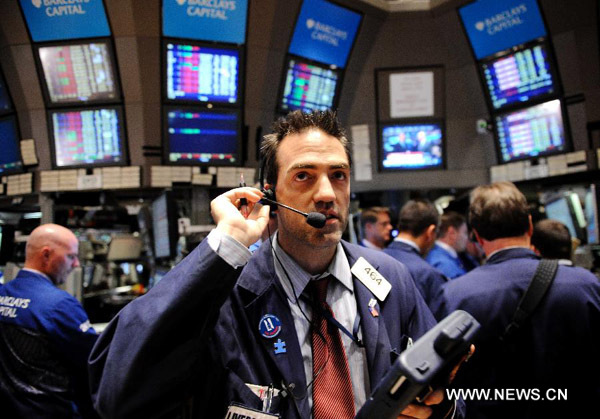Wall Street starts holiday week with big loss
 0 Comment(s)
0 Comment(s) Print
Print E-mail
Xinhua, November 22, 2011
E-mail
Xinhua, November 22, 2011
Wall Street started a holiday- shortened week with little to cheer. Heavily weighed by intensified debt woes on both sides of the Atlantic Ocean, investors fled to safe-haven assets, triggering severe sell-off in equity market.
 |
|
A trader works on the floor of the New York Stock Exchange in New York, the United States, Nov. 21, 2011. U.S. stocks ended lower on Monday, with each of the three major indexes losing around 2 percent. [Xinhua] |
The blue-chip Dow Jones industrial average tumbled 248.85 points, or 2.11 percent, to 11,547.31 as of Monday's close, the third decline in last four sessions.
The broader Standard & Poor's 500 declined 22.67 points, or 1. 86 percent, to 1,192.98, while the Nasdaq Composite Index plunged 49.36 points, or 1.92 percent, to 2,523.14, the fourth straight losses for both indexes. It was also the first time for the S&P 500 to end below the important psychological level of 1,200.
The CBOE Market Volatility Index, known as the "fear gauge" for the stock market, jumped above 35 intra-day before retreating to the level of nearly 33.
Investors were frustrated by both domestic and overseas news on Monday.
The super-committee, charged with writing a bill to reduce the budget deficit by at least 1.2 trillion U.S. dollars over the next 10 years, was unable to reach a deficit-reduction deal before Wednesday because of deep divide over taxes and spending. As a result, an automatic deep deficit-cutting process will be triggered and investors were concerned that the inability of the bipartisan Congress will add to chance for another downgrade of the U.S. credit rating.
In Europe, the already troubled debt crisis showed disturbing signs of further contagion. Moody's said a recent rise in interest rates on French government debt and weaker economic growth prospects could be negative for the country's credit rating, which added uncertainties to the already serious European debt woes.
Monday's economic data came in better than expected, but failed to lift market sentiment. According to the National Association of Realtors, existing home sales rose 1.4 percent in October to a seasonally adjusted annual rate of 4.97 million, better than analysts had expected but still at depressed levels.
Investors also shrugged off deal-making news, which were usually positive for equities. Viral-drug maker Pharmasset Inc surged nearly 85 percent after Gilead Sciences Inc revealed the plan to buy the company for 11 billion dollars in cash.






Go to Forum >>0 Comment(s)